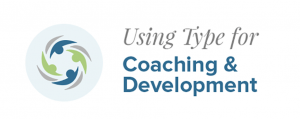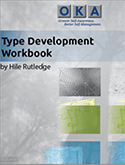What is Type Development?
Jung said that Sensing tells us that something IS, Thinking tells us WHAT it is, Feeling gives it value, and iNtuition gives it meaning. Type Development is always the goal.
So much surrounding Type emphasizes the preference for one end of a dichotomy over its opposite, but Type theory is actually a holistic theory of human cognitive development that illuminates the path we each most likely follow as we experience, develop, and ultimately build toward comfort and skill with all four mental functions (S, N, T and F) at the core of Type theory. Type suggests that our preferences are hard-wired and unchanging, but our Type development—the degree to which we can access and the skill with which we use all parts of ourselves—is continually changing, and hopefully increasing.
Usually an individual or organization’s Type development—good or bad—leads to predictable outcomes and observable behaviors that can signify likely successes and challenges. It is important to note the positive—indeed essential—qualities for effective individual and organizational life that each mental function provides. The underdevelopment of a function can block us from seeing the value or even the existence of that function. A great first step in any Type development effort is to establish the existence and the value of each of the functions and their respective, unique contributions.

What is the logic of Feeling?
The Feeling function helps us weigh how deeply we care about the things that will be gained or lost by each of the alternatives. Feeling seeks accord between our personal sense of values and our actions. Its personal nature helps us to focus on the relationships around us and how our decisions affect them. Feeling is empathic, values-focused, subjective and personal. Only the Feeling function can make decisions motivated by compassion and harmony.
Individuals with well-developed Feeling tend to be:
- Appreciative of others
- Sensitive conflict resolvers, disliking conflict and either avoiding it or diligently, even aggressively, working toward its resolution
- Quick to sympathize/empathize and stay personally connected to issues and people
- Gleaners of personal meaning from relationships and actions
- Builders of effective relationships
- In touch with his/her values and beliefs
Organizations with well-developed Feeling tend to have:
- A premium placed on loyalty
- Expressed concern and connection to work, colleagues, and outcomes
- An emphasis on having and fostering warm customer and co-worker relationships
- A familial and/or personal atmosphere
- A reward structure emphasizing kindness, personal connection, and team work
Individuals with under-developed Feeling tend to be:
- Insensitive, uncaring, and conflict-blind
- Disloyal, and perhaps even amoral
- Emotionally reactive in ways out of sync or proportion to the situation
- Selfish and/or self-satisfying
- Unable or unwilling to weigh impact on others
Organizations with under-developed Feeling tend to have:
- Little attention given to employee, client, co-worker and team needs
- A belief that conflict either does not exist or that conflict has no negative or toxic effect
- A mechanistic approach to work and the people who perform it
- Little loyalty to team, system or mission
- A caustic, abusive sense of humor
Next Steps:
Long a thought and training leader in Type Development, OKA offers two compelling and completely different training approaches to anyone interested in better understanding and more powerfully using Type.
 Pearman Certification introduces participants to the newest and sharpest Type tool, the Pearman Personality Integrator. This two-day class is offered in-person and online and empowers its participants to use this great new tool to support and drive focused Type Development.
Pearman Certification introduces participants to the newest and sharpest Type tool, the Pearman Personality Integrator. This two-day class is offered in-person and online and empowers its participants to use this great new tool to support and drive focused Type Development.
 Using Type for Coaching and Development is a rich and sophisticated deep dive into Type Theory, the MBTI and Type Development. In this interactive, two-day class, participants come to understand and learn how to teach and apply Type Dynamics (dominant, auxiliary, tertiary and inferior functions), balance and Type Development–even getting to practice accessing and using each of the four mental functions.
Using Type for Coaching and Development is a rich and sophisticated deep dive into Type Theory, the MBTI and Type Development. In this interactive, two-day class, participants come to understand and learn how to teach and apply Type Dynamics (dominant, auxiliary, tertiary and inferior functions), balance and Type Development–even getting to practice accessing and using each of the four mental functions.
OKA also publishes the Type Development Workbook, by Hile Rutledge to support the deep dive into Type Dynamics and Type Development.
Consider these related OKA Type Development blog titles
- OKA’s Type Development Series–#1: The Value of Thinking
- OKA’s Type Development Series–Developing T
- OKA’s Type Development Series–Developing Feeling
- OKA’s Type Development Series–#3: The Possibilities of Sensing
- OKA’s Type Development Series–Developing S
- OKA’s Type Development Series–#4: The Details of iNtuition
- OKA’s Type Development Series–Developing N


I strongly support your effort to move people toward helping people learn how to use all the skills associated with the functions! Keep up the good work!